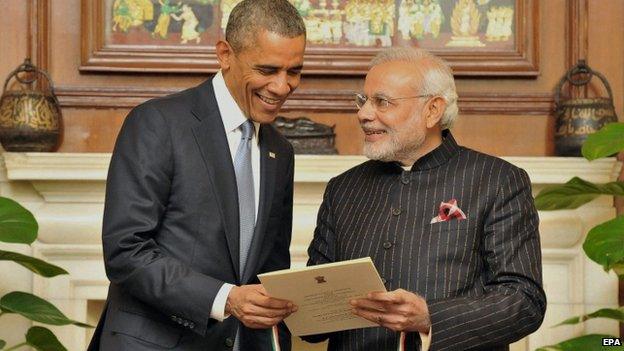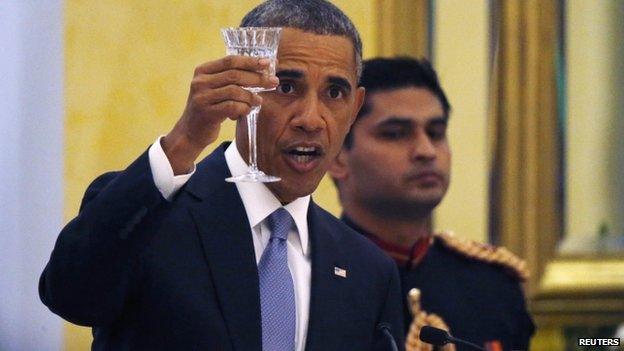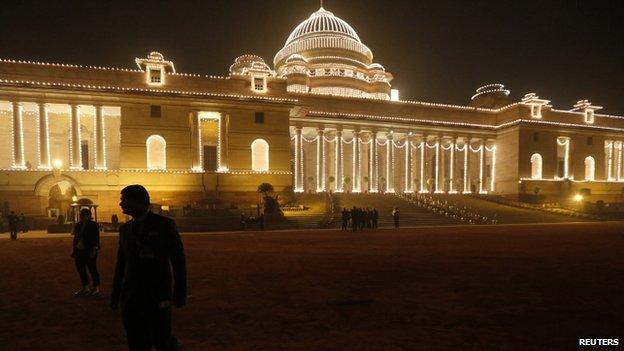Media praise India-US nuclear agreement
- Published

Papers say the two leaders have "good personal chemistry"
Papers hail the breakthrough in the Delhi-Washington nuclear deal, and reflect on India's democratic journey as the country celebrates its 66th Republic Day.
The US and India on Sunday announced a breakthrough on a pact that will allow American companies to supply India with civilian nuclear technology.
It came on the first day of President Barack Obama's visit to India.
The nuclear pact had been agreed in 2008 but the US was worried about Indian laws on liability over accidents.
"When Prime Minister Narendra Modi announced that the two countries were proceeding towards commercialisation of the deal, it is evident that a final page has been decisively turned with the policy hurdles having been cleared," says The New Indian Express, external in an editorial.
The paper, however, cautions that the deal is yet to be put into practice by Indian and US companies.
"We should welcome the outcome with caution for we know agreements have to be translated into reality. There could be slips between the expectation and the eventuality," it adds.
The Hindustan Times, external says "the agreement ensured that a day replete with symbolism also packed in plenty of substance".
"In addition, the two sides operationalised joint production of key defence equipment, spoke of a new vision for the Asia Pacific, where rival China is flexing its muscles, strengthened cooperation in clean energy and pledged to fight terror," it says in a report.
The Deccan Herald, external seems to give much credit for the deal to personal ties between the two leaders.
"From their warm hug at the airport to the one-on-one discussion over tea at Hyderabad House, a personal chemistry was at work between Mr Obama and Mr Modi," it says.
But beyond such symbolic gestures, papers have also been discussing the fine details of the deal.
"The next steps aren't clear, though. The situation now is that the White House expects a 'Memorandum of Law', explaining how Indian law is compatible with what the US seeks on liability. The [Indian] ministry of external affairs doesn't have a timeline on this, saying it is a 'work in progress'," senior analyst Praveen Swami writes in The Indian Express., external

'Glossing over differences'

President Obama has pledged to further improve ties with India
Other analysts feel that the complexity of this deal shows the difficult nature of Washington-Delhi ties.
"That it has taken six years to get to this partial solution is a reminder of how difficult it is to get complex things agreed upon between two countries with robust democratic structures and independent judiciaries," says an article in the Hindustan Times.
The report also discusses the possible role Washington expects India to play in Afghanistan.
"Obama and Modi spoke briefly of the two working together to 'help Afghanistan through its present transition', glossing over the deep differences between the two countries on reconciling the Kabul government with the Taliban," it adds.

India's democratic journey

All official buildings, including the Presidential Palace, have been decorated for the celebrations
Papers are also discussing India's democratic past and the future as the country hosts Mr Obama as the chief guest on its Republic Day celebrations.
The Times of India praises the country's constitution and its track record as the world's largest democracy.
But it adds that "India has been a chronic underachiever relative to potential... Indians still do far better abroad than they do at home. This needs to change".
The papers also sound caution over the rise of Hindu nationalism in India.
The Times of India, external says Hindu nationalist organisations like the Rashtriya Swayamsevak Sangh (RSS) need to play a better role in keeping India united.
The ruling Bharatiya Janata Party draws its ideological roots from the Hindu nationalist RSS.
"On economic policy, they [RSS] support the same left-wing dirigisme that has kept India down. And in social policy they want to keep minorities down, a 21st-century no-no which would also boost Muslim fundamentalism," says the paper.
The Asian Age says the Indian state has continued to show its inherent characteristics of aspiring to deepen democracy.
But the paper also highlights Mr Modi's struggle to keep the RSS happy while pushing the country on the path of development.
"The struggle is obvious, with a former RSS activist [Mr Modi] adorning the office of prime minister and being constrained to remain mute on transgressions of the democratic ethos by those of his ilk, even as he himself speaks ever more forcefully of 'development," it says.
BBC Monitoring, external reports and analyses news from TV, radio, web and print media around the world. You can follow BBC Monitoring on Twitter , externaland Facebook, external.